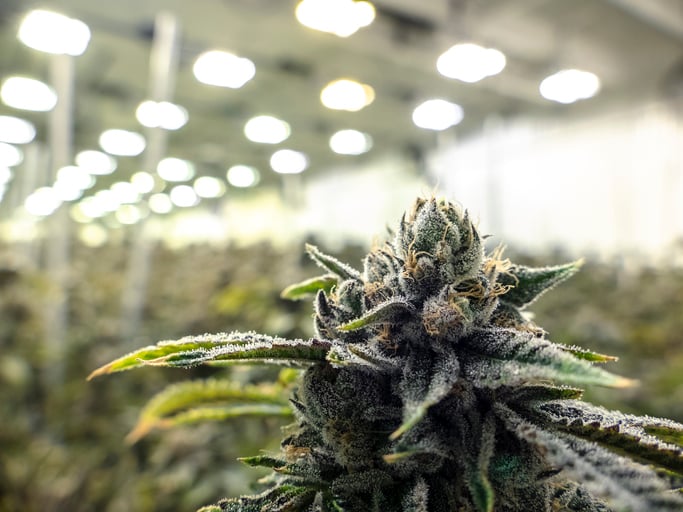For years, the cannabis industry has been virtually unstoppable. Investors with the foresight, stomach, and luck to buy into some of the industry's biggest names are likely sitting on quadruple-digit gains today.
But over the past five months, those gains have proved fleeting for a majority of cannabis stocks. Canopy Growth (CGC 1.35%), the largest marijuana stock in the world by market cap, has seen roughly half of its market value evaporate since late April, with the company losing something even more important on Aug. 15: its large-cap status.

Image source: Getty Images.
With the brief exception of Tilray and its hyperbolic move higher in September 2018, Canopy Growth has consistently supported at least a $10 billion market cap, which is the low-end requirement for being considered a large-cap stock. This psychological market cap has been viewed by Wall Street as validation that legal cannabis and companies like Canopy Growth are here to stay. But following the company's fiscal first-quarter results, Canopy has ceded this psychological barrier and is now valued at less than $9 billion.
Below, you'll find 10 compelling reasons why Canopy Growth is no longer a large-cap stock, as well as why it should stay that way for the foreseeable future.
1. Cannabis sales are flat
Though it's a problem that's industrywide, Canopy's cannabis sales are basically running in place. Net marijuana revenue over the past three quarters has respectively totaled (in Canadian dollars, CA$), CA$71.6 million, CA$68.9 million, and CA$71.7 million. The industry (and company) are clearly working through some growing pains, and it's evident in the company's operating results.
2. The lowest gross margin among major producers
Speaking of operating results, the 15% gross margin that Canopy Growth registered in the first quarter will very likely be the low-water mark for the industry. The company did note in the fiscal first quarter that it had to do some inventory rebalancing, which led to a greater percentage of lower-margin dried flower being sold, relative to high-margin oils and softgel capsules. Nevertheless, Canopy's high costs and low margins stick out like a sore thumb.

Image source: Getty Images.
3. Losses are mounting
Continuing with the income statement pain, the company is losing money at an alarming rate. Inclusive of a huge charge derived from the extinguishment of warrants tied to investment partner Constellation Brands (STZ +1.26%), Canopy lost CA$1.28 billion in Q1 2020. But even taking out this one-time charge, the company lost CA$123.1 million on an operating basis -- and that was with the help of a CA$87.3 million gain from fair-value adjustments. It's looking like Canopy Growth could be one of the last pot stocks to generate a recurring profit.
4. Supply issues remain persistent throughout Canada
As alluded, the marijuana industry is contending with a number of growing pains. In Canada, for example, regulatory agency Health Canada has been overwhelmed with licensing applications for cultivation, processing, distribution, and sales. Although changes have been made to the cultivation license application process that should expedite reviews and help Health Canada "catch up," it's still going to take many quarters before licensing approvals and packaging solutions shortages are worked through. That's bad news for a giant like Canopy Growth.
5. Short interest has risen to 10% of outstanding shares
Pessimism has also been building among investors. Over the past year, the number of shares held short by investors has risen by 227% to about 34.4 million shares. That's roughly 10% of the company's outstanding share count. Though rising short interest isn't necessarily an indicator of doom, it does suggest that investor skepticism in the largest marijuana company in the world is growing.

Image source: Getty Images.
6. The company's U.S. focus has a long payoff runway
Canopy Growth has also focused heavily on the U.S. market, which should be the world's leading source of cannabis sales over the long run. Thus far, Canopy has acquired intellectual property company ebbu, was awarded a hemp-processing license in New York state, and has agreed to acquire Acreage Holdings on a contingent-rights basis. The problem is that the chances of legalization are slim to none in the U.S. through 2020, meaning Canopy's investments in the U.S. could take a long time to pay off.
7. International sales growth is still unremarkable
To build on the previous point, Canopy Growth's push into overseas markets is going to take time to yield significant sales. Despite having a presence in 16 countries (including Canada), Canopy won't be able to really monetize foreign markets until demand in the Canadian market is satisfied. With supply issues still ongoing, it could take quite a bit of time before Canopy's domestic market is saturated with marijuana products.
8. The company's visionary was shown the door
Don't overlook the impact of former co-CEO and company visionary Bruce Linton being shown the door on July 3, 2019. Linton apparently got too aggressive with his spending for equity investor Constellation Brands' liking, but he was undoubtedly the face of Canopy Growth and the company's guiding force. Without the leader who took Canopy into the U.S. market and arranged for Constellation's groundbreaking $4 billion investment, it's unclear what the future will hold for the company.

Image source: Getty Images.
9. Constellation is running the show
Another reason Canopy is no longer a large-cap stock could be that Wall Street realizes Constellation Brands is now running the show. When Constellation made its game-changing investment in Canopy Growth, it was able to put two of its own executives -- and two independent directors -- on Canopy's board. This representation allows Constellation to wield significant power in terms of guiding Canopy's path forward, and it led to Linton's firing.
10. Goodwill is soaring
Last, but not least, the company's goodwill -- i.e., the premium paid for acquisitions above and beyond tangible assets -- has soared. In the latest quarter, Canopy Growth's goodwill rose by CA$387 million to CA$1.93 billion, and it now accounts for about 22% of the company's total assets. If the company isn't able to recoup the value of this goodwill by developing its acquired assets and monetizing its purchased patents, a big writedown could await.
Canopy Growth -- and the entire industry, for that matter -- needs time to mature, and it wouldn't be surprising if the company isn't able to regain its large-cap valuation anytime soon.







